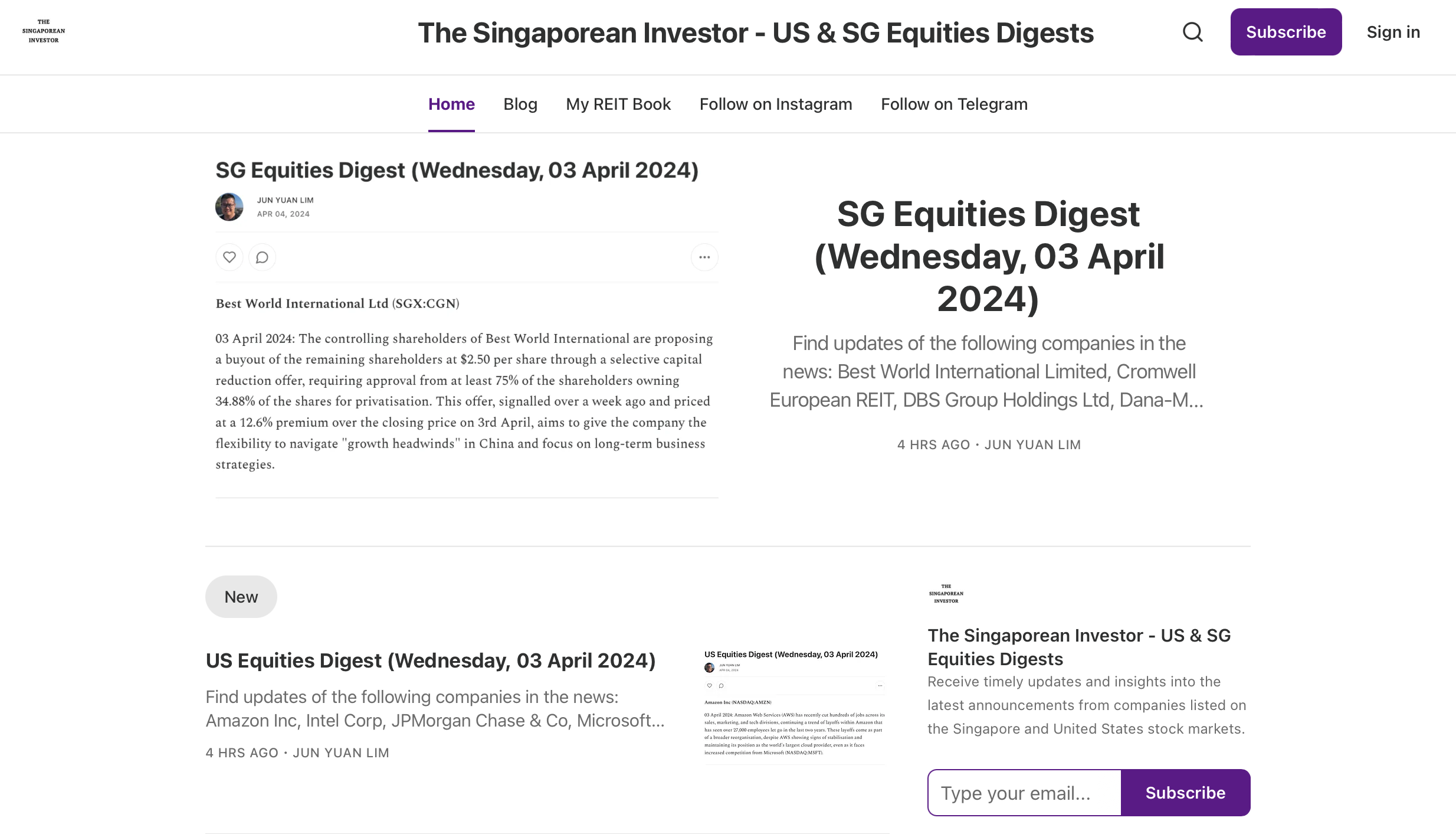The first Real Estate Investment Trust, or REITs for short, was listed on the Singapore Exchange back in 2002.
For those who are new to REITs, basically, they invest in income producing real estate properties. Some of the properties they invest in include retail, office, industrial, logistics, data centre, hospitality, and healthcare properties.
As REITs have to pay out 90% of their earnings as distributions to unitholders to qualify for tax benefits, their high distribution yield (of 5-6% on average) garnered interest among retail investors.
However, the Covid-19 pandemic back in 2020 brought upon new habits being formed, including online shopping, as well as working from home.
This, on top of the current high interest rate environment, have gotten retail investors worried about whether REITs still remain a viable investment option to build their income portfolio.
Let us have a look at each of them in more detail in this article:
Online Shopping’s Impact on Retail REITs
As a result of the ‘circuit breaker’ introduced by the Singapore Government back in April 2020 to slowdown the spread of the Covid-19 pandemic, where only essential businesses (such as those in the food and beverage, supermarkets, and pharmacies) were allowed to continue with their operations, people turned to shopping online.
With all the safe measurement measures already removed, are people continuing to stay away from the retail malls and shopping online?
The answer is no – all the retail malls have reported that tenant sales have surpassed pre-pandemic levels. At the same time, the occupancy rate of the retail malls have been maintained at above 90.0%.
Why is this so?
First, Singapore is a hot and humid country. Hence, it’s no surprise that Singaporeans prefer to spend their weekends and public holidays in retail malls where it is air-conditioned. More often than not, while they are at the malls, they will have a meal there, and shop around.
Second, no doubt Singaporeans like to shop online due to the attractive deals dished out by the online shopping apps, but most would prefer to have a ‘look and feel’ of the products before making any purchases, especially for high ticket items. Retailers are aware of this, and in response, they have adopted an omnichannel approach – meaning they have an offline presence in the shopping malls for people to understand more about the products, as well as an online presence for customers to shop 24/7.
Third, a huge percentage of the retail spaces are leased to tenants operating in the food & beverage, as well as lifestyle businesses (including tuition and enrichment centres, massage parlours, personal grooming, cinema, etc.), all of which is not possible to replicate online.
Work from Home and Office REITs
I still remembered the days when ‘Work from Home’, or WFH for short, was the default option during the peak of the Covid-19 pandemic back in early-2020.
Back then, many employees, especially those who do not a proper desk to work at home, were resistant to it. However, as creatures of habits, people eventually became used to it, and these days, they will reject job openings that do not allow for ‘flexi-working’.
Employers were aware of this, incorporated hybrid working (meaning staffs will spend some days working in the office, and some days working from home), and down-sized their office spaces as a result.
Despite of that, the occupancy levels of office properties have been maintained at a very strong level of above 90.0%. Why is that so?
First, as most of the homes in Singapore are small in size, many do not have the luxury of having a proper study table to work comfortably. Hence, this group of people choose to return to the office. The hot and humid weather in the country was another reason as well.
Next, while some companies have downsized their office spaces, but the office spaces were quickly filled, because of Singapore’s status as one of the key ‘financial hubs in Asia’, as well as the country’s political stability – these 2 factors attracted many Multi-National Companies (MNCs) to make Singapore their country of choice when they want to expand their presence in Asia.
The Role of Rising Interest Rates
Remember in the earlier part of this article, I mentioned that REITs are required to distribute at least 90.0% of their earnings as distribution to unitholders in order to enjoy tax benefits?
As a result, whenever they need to acquire properties, they will need to take on bank loans. This wasn’t a problem before 2022 when interest rates were at a low.
However, a series of aggressive interest rate hikes by the US Federal Reserve in 2022 to tame rising inflation have saw interest rates soaring from a low of 0-0.25 before March 2022 to a high of 5.25-5.5% in July 2023 – the highest level since 2001.
With a huge spike in borrowing costs, the REITs’ management adopted a prudent approach when it comes to capital management and as a result of this, acquisition activities have slowed significantly.
This has, in turn, led to a slowdown in revenue and distribution payout growth. Coupled with a higher borrowing cost, distribution payouts of many of the REITs are very likely to record a decline this year compared to the last – which was one of the contributing factors for the tumbling of the REIT’s unit price.
At this point in time, I am of the opinion that we are likely at the tail end of the current interest rate hike cycle. While the US Federal Reserve have signalled that interest rates are likely to stay at high levels for longer to bring inflation down to its target of 2%, but in my opinion, in time to come, they will come down to a more reasonable level.
More often than not, REITs with a competent management, a track record of stable financial performance over the years, along with those with a solid Sponsor will be among the first to restart their acquisition activities and grow the REIT once again.
Hence, it becomes all the more important at this point in time to be more selective and invest only such REITs.
In Conclusion
While online shopping, and working from home are now part of our lives, but retail malls and office properties have continued to remain very resilient, with their occupancy rates maintained at above 90.0%.
For the former, it was mainly due to the retail tenants adopting an omnichannel approach to their business, and many of the tenants in the retail malls are in the food & beverage and lifestyle businesses; for the latter, it was largely contributed by Singapore’s status as one of the key financial hubs of Asia, as well as its political stability attracting companies from around the world to set up their business presence here.
Finally, on the high interest rate environment we are in, no doubt the slowdown in acquisition activities and rising finance costs will impact the REITs’ distribution payouts for the full-year, but the good news is, we are likely at the tail-end of the interest rate hike cycle. Once interest rates start to come down, REITs with competent management and solid track records will be among the first to restart their acquisition activities and grow again.
Investors should carefully consider their own investment objectives and risk tolerance before investing in REITs. It is also important to do your own research and select REITs with strong fundamentals.
Catch Me "Live" at the REITs Symposium 2024 - the Largest REIT Event in Singapore!
I am absolutely honoured to be invited to contribute to not just 1, but 2 segments in this year's REITs Symposium (held on Saturday, 11 May 2024 at Suntec Convention Centre Level 3, Summit 1 & 2 between 9am and 5pm), with the schedule as follows:
- From 2.00 to 2.30pm, I'll be at the Engagement Stage presenting "REITs 101: Winning in an Investing Marathon."
- Then, from 4.05 to 4.50pm, I'll join forces with REIT specialist Kenny Loh and Thomas Chua from Steady Compounding in a panel session on the Main Stage to delve into "Can You Retire Early and How?"
Take advantage of these special discount codes for exclusive savings:
- Use REITS24 for a 50% discount on individual tickets, now only $5 (Regular Price: $10)
- Use RBUDDY for a 60% discount on tickets for two, priced at just $8 (Regular Price: $20)
You can find out more about the event and secure your seat here.
Many thanks for your support and advance, and I hope to see you at the event! :)
Get Your Daily Dose of the Latest on US & SG-listed Companies (Updated Every Weekday)

Stay updated on the latest trends and developments for companies listed on the Singapore and US stock markets by visiting The Singaporean Investor's Substack page for daily updates. Check it out here...
Are You Worried about Not Having Enough Money for Retirement?
You're not alone. According to the OCBC Financial Wellness Index, only 62% of people in their 20s and 56% of people in their 30s are confident that they will have enough money to retire.
But there is still time to take action. One way to ensure that you have a comfortable retirement is to invest in real estate investment trusts (REITs).
In 'Building Your REIT-irement Portfolio' which I've authored, you will learn everything you need to know to build a successful REIT investment portfolio, including a list of 9 things to look at to determine whether a REIT is worthy of your investment, 1 simple method to help you maximise your returns from your REIT investment, 4 signs of 'red flags' to look out for and what you can do as a shareholder, and more!

You can find out more about the book, and grab your copy (ebook or physical book) here...





Comments (0)